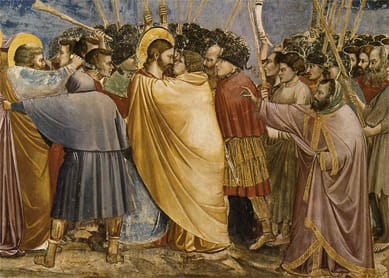It was, St. Paul said, through one man’s sin of pride that death entered the world (c.f. Romans 5:12). It was through another man’s envy that death was realized. Cain killed Abel out of envy. This pattern, pride followed by envy, is the same path followed by Lucifer. First pride in defining how he would be like God, then through envy he attacks mankind (c.f. Wisdom 2:23-24). It is one of the Seven Deadly Sins and is perhaps the deadliest of these vices because of the way in which it addicts us to misery.
Envy is, according to St. Thomas Aquinas (who cites St. John Chrysostom), is “sadness at another’s good” (De Malo, q.10 art.1). And herein lies the reason for its deadliness. Properly speaking, sadness is oriented towards evil and should only be experienced in its presence. For the envious, it is good that causes it. This is because the man with the vice of envy experiences someone else’s good as a threat to himself. More specifically the good of the other person is thought to detract from his own excellence. And since he experiences sorrow, sorrow that can only be mitigated by removing the evil cause, they will for the person’s excellence to no longer below to him. They don’t really care if they receive the excellence, they only want the other person not to have it. Victor Hugo, in his poem, Envy and Avarice, captures the envious heart. When God offers envy anything he wants with the only condition that his neighbor will get double, he says “I would be blinded of one eye!”.
The Evil Eye
What Hugo is subtly pointing out is how envy has its punishment built in. The misery the envious experience never really lets up as long as envy lives in their heart. Their sadness never subsides while the vice is still present. In this way some have called it the “just vice.”
The blindness that comes from only one eye is also particularly descriptive because, although envy is in the will, it stems from the inability to see correctly. The envious see everything in terms of competition. Their self-worth is predicated upon being better than someone else. Their self-love is only possible when they hate their neighbor since envy renders them unable to “will the good of the other.”
As a culture addicted to self-esteem, we are particularly vulnerable to envy. This is why when someone does or achieves something good, there are always people who go searching out, usually through old social media posts, evidence that the person is deeply flawed. Apologizing to the envy mob only has the effect of inflaming them further. There can be no forgiveness for wrongs, real or perceived, when it is the good that the person has done that is experienced as the evil. Cancel culture is not just about controlling thoughts, but also, and maybe primarily, about indulging envy.
The Second Greatest Commandment, according to Our Lord, is to “love your neighbor, as yourself” (Mark 12:31), but the envious find this command impossible because they do not grasp what the love of self means. This connection between love and self and love of neighbor often causes us to confuse envy with jealousy. Although they are often used synonymously, jealousy means that you love something that you possess, but fear that that it might be taken away. Envy has no such desire to possess, only to see the other not have it. Jealousy regards sadness at the prospect of losing something good that you already have while envy is sadness in reaction to someone else’s good.
The envious also are rendered incapable of fulfilling the First Commandment as well. The hatred of neighbor necessarily spills over to God who is “the Giver of all good gifts” (James 1:23-24). He ultimately bears the blame for unequally distributed His gifts and excellencies among His creatures. Envy makes us like the younger brother in the story of the Prodigal Son.
Like all vices, envy is baked into our fallen nature and can only be removed by intentionally acting against it. This, of course requires that we are able to identify it in our pattern of thoughts. Envy is tricky because it hides in the dark. Unlike the other vices, no one wants to admit to being so petty. As Rebecca Konyndyk puts it in her book Glittering Vices, envy shuns open warfare mostly because of the feeling of inferiority—to declare one’s envy is to admit one’s inferiority. And so, it normally is exercised through sins of the tongue such as detraction, slander and calumny. We use all of these to keep others from holding the person in such high esteem. It also manifests itself through belittling and “roasting” the other person.
De-programming Envy
Just as Sloth is the vice by which we fail to love God, envy is the vice though which we fail to love our neighbor. So, one of the opposing virtues is charity. Properly understood, charity is loving another person for God’s sake. By loving the excellence of the other because it ultimately comes from God, we develop the habit of rejoicing in the good of others.

In practice it consists in the virtue of kindness which is a fruit of the Holy Spirit (c.f. Gal 5:22). Kindness flows from a burning desire to do good for one’s neighbor in a specific and concrete way. As an example, St. Martin de Porres who often was the subject of severe ridicule because of his mixed-race complexion, would run after someone when they made fun of him in order to do some kindness for them.
St. Thomas also mentions that because envy regards two objects—namely the sadness and the prosperity of a good person, it has two contrary virtues. First there is pity by which one grieves, both affectively and effectively, the misfortune of a good person. Likewise, zealous anger is the opposing virtue by which one is saddened at the prosperity of the wicked.

